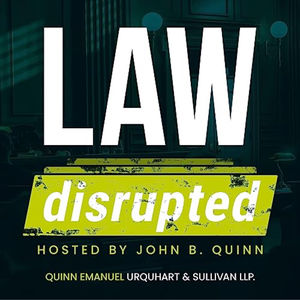In this episode of Law, disrupted, John is joined by Dr. Marcus Grosch, managing partner of Quinn Emanuel’s German offices. Together, they discuss German patent law. Marcus is regularly awarded top ratings in leading international and German-ranking publications, and both Chambers Europe and Chambers Global have listed him as a “highly regarded patent litigator.” The conversation begins with John noting how Germany is arguably the world’s second most important patent litigation jurisdiction after the U.S. They highlight how major technology disputes in the U.S. district courts are often seen in parallel proceedings in Germany. Marcus notes that Germany is integral to the patent litigation world due to the sheer number of cases it receives, as the German economy is far more resilient and bigger relative to its other European counterparts. He touches on how Germany’s significance in the field of patent litigation can be traced back as far as the 1950s. Marcus explains how Germany’s time to trial is also far quicker than in other major European nations, with the fastest trials taking place in Munich and Mannheim, which only take twelve months. He highlights how at least 50% of the patents, whose validity is challenged, are either entirely revoked or significantly amended. Marcus argues that district courts have to be more conscious of the consequences of their decisions, therefore, they have to be more prudent and look more closely into the validity issues, which they are generally ready to do. Then, John asks Marcus for advice for other lawyers involved in patent litigation in the U.S. and parallel proceedings in Germany. Marcus highlights how in the U.S., the work has to be done ahead of the filing, which is very different from Germany – most of the cases in America need a notice pleading in the first step, whereas Germany requires a case to be complete from the outset. He also points out how different cases are in Germany compared to the ones in the U.S. The most significant difference is that Germany, like all continental European jurisdictions, does not have a trial-based system, so the parties’ arguments are not exclusively presented to the trier of fact through evidence, like witness examinations. Rather, more like in an appellate hearing, the lead counsel, guided by questions and introductory remarks from the bench, has to address all relevant issues of law and fact in the main hearing. The taking of evidence is limited to specific instances, in which contested issues of fact are directly relevant for the court’s decision. However, many factual issues are not in dispute at the end of the process, which is the result of specific pleading standards and flexibly shifting the burden of proof. This is also important since all continental European jurisdictions have no general pre-trial discovery system. All issues of law and fact are addressed in the main hearing, with no separate motions to dismiss or claim construction decisions ahead of the main hearing. This requires significant preparation and time in court, which Marcus highlights vary depending on the case, with the average patent case being four hours. He notes how sometimes the preparation can take significantly longer than the actual hearing. In addition, he explains how he deals with a ‘hot bench’ over 90% of the time, as judges are very ambitious, prepared and equipped with all of the information and specific details. Finally, John and Marcus discuss European law and how there is no civil litigation at the European level, so patents need to be litigated in national courts. This will now be fundamentally changed with the Unified P Podcast Link: Law-disrupted.fm Host: John B. Quinn Producer: Alexis Hyde Music and Editing by: Alexander Rossi

Patent Litigation in Germany
48分钟 · 179·
179· 0
0
 179
179 0
0
